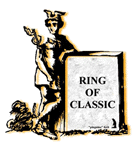Perhaps word patterns and rhythm are part
of the mammal's psyche. They are certainly part of our ability to remember,
as myths are part of our ability to understand.
As research has continued it now seems
that the great formative saga have always been handed down accurately from
one bard to another long before the written word came into being, to destroy
our memories. This seems to be true whether we are looking at Norse Saga,
Ancient Veda, The Iliad and the Odyssey, The First Covenant of the Hebrew
Nation or the tales of Grimm.
Even in our own generation poets seem to
remember the old tales, even if they don't know whence they came. Some
poets of the English tradition revelled in their knowledge of, and use
of the ancient tongues. Even folk art, and songs in the vernacular relied
on bardic memories. Events such as the plague were recorded in nursery
rhymes, remembered to this day.
We all seem to love our heritage
- at least in part, as witness the work of ancient poets in modern music,
for example, O Fortuna, by Catullus. It is scarcely possible to form a
reasonable English sentence without the vocabulary of the ancients enriching
us.
Of course, the field is huge, rich and
variable. Where to start is the big thing. It is still possible to bliss
out on the poetry of Sappho, the metamorphoses of Ovid, the Song of Solomon,
and the stanzas of the Baghavadh Gita, even in translation.
In the time I've had access to the Internet
I have found some wondrous resources, for the time being we shall start
with them.

|
Samuel Butler's translation of the Illiad
them the Iliad
and
Odyssey
by Homer.
|
An attractive page dedicated
to the poet
SAPPHO
Thank you Rebecca
of Rhode Island!
|

FOR A LIST OF SITES DEVOTED TO SOME FASCINATING
SITES ABOUT THE ANCIENT WORLD